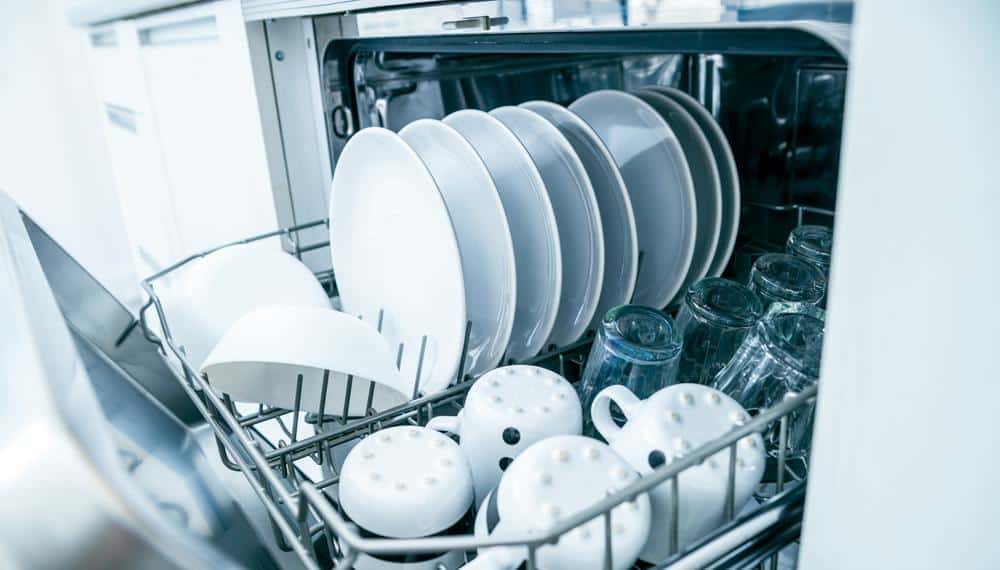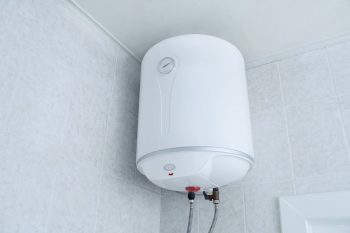
You may be asking yourself why your dishwasher leaves a white residue on your dishes. This common problem can be frustrating, especially when you’ve loaded the dishwasher hoping for sparkling clean dishes, only to find them covered in a white, chalky film. The good news is, this issue can be fixed. In this comprehensive guide, we will explore the reasons behind the white residue and provide effective solutions to tackle it.
The white residue left by your dishwasher on your dishes is usually caused by hard water, which contains high levels of dissolved minerals. Other factors include the type and amount of detergent you use, limescale or salt residues, the age and model of your dishwasher, and how you load your dishes. You can prevent this by using a water softener, choosing a high-quality detergent, cleaning your dishwasher regularly, loading your dishes correctly, and using rinse aids.
Hard Water: The Main Culprit
One of the primary causes of white residue on your dishes is hard water. Hard water contains high levels of dissolved minerals, primarily calcium and magnesium, which can leave a stubborn, white, chalky residue on your dishes and glassware. This residue is not only unsightly but can also be hard to remove.
If you’re dealing with hard water, consider using a water softener to reduce the mineral content in your water. You can also run a cleaning cycle with two cups of white vinegar in your dishwasher to remove mineral deposits, a method that has proven effective for many dishwasher users.
The Role of Dishwasher Detergent
The type and quality of dishwasher detergent you use can significantly affect the residue left on dishes. Using too much detergent or low-quality detergent can result in a soapy residue on dishes, often manifesting as a white, chalky substance. It’s recommended to use high-quality detergents like Cascade® Platinum™ ActionPacs™ or Finish® Quantum® Automatic Dishwashing Detergent for better wash performance and reduced residue.
Limescale or Salt Residues
If you notice that the white residue can be easily wiped off with a finger, it’s likely due to limescale or too much salt. Regularly cleaning your dishwasher with vinegar can help remove limescale and prevent salt residues.
Dishwasher Model and Age
The model and age of your dishwasher can also influence the occurrence of white residue. Older dishwashers or those with outdated technology may not be as effective in removing mineral deposits from hard water. Regular maintenance and cleaning can help keep your dishwasher in top shape and prevent white residue.
Loading Dishes Correctly
The method of loading dishes into a dishwasher significantly affects the cleanliness of the dishes. It’s best to load dishes with their dirty sides facing the center of the dishwasher, angle dishes downward, and avoid overcrowding. Following these tips can ensure that your dishes come out clean and free of grime after each cycle.
The Use of Rinse Aids
Rinse aids can also help in preventing white residue. They contain surfactants that lower the surface tension of water, allowing it to roll off your dishes instead of forming droplets and leaving spots. Fill the rinse aid dispenser in your dishwasher according to the manufacturer’s instructions to see the best results.
Conclusion
The white residue on your dishes can be a result of several factors, including hard water, dishwasher detergent, limescale or salt residues, or even the age and model of your dishwasher. However, by taking a few simple steps like using a rinse aid, checking your detergent, addressing hard water issues, ensuring proper water temperature, and cleaning your dishwasher regularly, you can prevent white residue from appearing on your dishes.
Remember, a clean dishwasher equals clean dishes. Regular maintenance and attention to detail can go a long way in keeping your dishwasher running smoothly and your dishes spot-free.
Frequently Asked Questions
What are some brands of water softeners I can use to reduce hard water?
Some popular brands of water softeners include Aquasana, Morton, and Fleck. Remember to choose a water softener that’s suitable for your specific needs and water hardness level.
How often should I clean my dishwasher with vinegar to remove limescale and salt residues?
It’s recommended to clean your dishwasher with vinegar once a month. This frequency can help maintain your dishwasher’s performance and prevent buildup of limescale and salt residues.
How can I tell if the white residue on my dishes is due to hard water?
The best way to tell if hard water is the cause of the white residue on your dishes is to test your water hardness level. You can do this by purchasing a water testing kit from a local hardware store or online. If your water hardness level is high, it’s likely causing the white residue.
Can I use any kind of vinegar to clean my dishwasher?
While any vinegar can work, it’s best to use white vinegar to clean your dishwasher. It’s effective at removing mineral deposits and doesn’t leave a strong odor.
What is the proper water temperature for a dishwasher to prevent white residue?
The ideal water temperature for most dishwashers is around 120-150 degrees Fahrenheit. This temperature helps dissolve detergent better and prevents residue. Check your dishwasher’s manual to find the recommended temperature setting.












